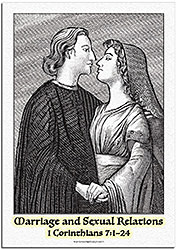First Corinthians 7:1–24 . . .
Marriage
Apostle Paul begins his discourse on “marriage” with a puzzling statement: “It is good for a man not to have sexual relations with a woman.” This was probably a statement made by the Corinthian Christians, about which they wrote to Paul to see if he agreed (7:1, shown at the bottom of this page). It appears here that Paul is about to clarify the principal of “purity.”
Why would the Corinthian believers suggest complete celibacy? Perhaps they figured that if sexual immorality was such a danger (as documented in last week’s commentary of 6:12–20), then one could be more pure by abstaining from sex altogether, even in marriage. In vv. 3–6, Paul focuses on mutual sexual responsibility in marriage, telling the Corinthian Christians the following.
(a) It’s wrong for a husband and wife to deprive each other of sexual relations.
(b) The wife doesn’t have authority over her own body but yields it to her husband; similarly, the husband doesn’t have authority over his own body but yields it to his wife.
(c) Paul rejects their idea that husband and wife could be more holy by sexual abstinence. In fact, harm can come when they deprive one another by opening the door to Satan the tempter.
(d) God will permit (reluctantly, as a concession) a married couple to abstain from sexual relations for a short time; then husband and wife must come together again in a sexual sense.
The principle in this passage is important. God makes it clear that there’s nothing wrong and everything is right about sex in marriage. Satan’s great strategy, when it comes to sex, is to do everything he can to encourage sex outside of marriage, and to discourage sex within marriage. Satan is victorious if he accomplishes either plan.
Next, in vv. 7–9, Paul recognizes the benefits of singleness as well as marriage; all is according to how God provides gifts. Paul, at the time of this writing, was unmarried. Here he recognizes the benefit of being single, which he’ll speak more of later in this first letter. Though he knew that singleness was good for him, he wouldn’t impose it on anyone. What’s important is the gift that one receives from God — being gifted to singleness or marriage.
When Paul writes, “But if they cannot control themselves, they should marry, for it is better to marry than to burn with passion” (v. 9), he recognizes marriage as a legitimate refuge from the pressures of sexual immorality. One shouldn’t feel immature or unspiritual because he or she desires to get married so that they’ll no longer burn with passion.
While vv. 10–11 deal with “divorce and separation for Christian couples,” vv. 12–16 deal with “divorce and remarriage when a Christian is married to an unbelieving spouse.” Next, Paul encourages the Christians in Corinth to “live for God right now as they were called.” In vv. 18–20, he highlights the principal of “living as you are called” by using the principal of the practice of circumcision. He’s saying, for example, that if you were circumcised when you became a Christian, fine; if you weren’t circumcised when you became a Christian, fine also. Circumcision doesn’t matter! What matters is serving the Lord here and now.
Moving from circumcision, Paul turns his attention to slavery by teaching the Corinthian Christians that a slave can please God while being a slave. He shouldn’t live his life thinking, I can’t do anything for God now, but I sure could if I were a free man. He can, and should, serve God now as he’s able to do so.
Note: 1st Corinthians challenges believers to examine every aspect of their lives through the lens of the Gospel. In chapters 5–7, Paul presents these three challenges:
Dealing with a case of incest (ch. 5) | Lawsuits among believers (ch. 6) | Concerning married life (ch. 7)
› Watch BibleProject’s superb animated video (1 min.) that highlights Paul’s messages in these three chapters.
† Summary of 1 Corinthians 7:1–24
The text of this passage addresses various issues related to marriage, singleness, and sexual ethics. Here’s my summary of its key points:• Marriage and Sexual Relations
Paul affirms that marriage is good and that spouses have a mutual obligation to fulfill each other’s sexual needs. He advises:
† Married couples shouldn’t deprive each other of sexual relations.
† Temporary abstinence is acceptable only by mutual consent for prayer.
† Sexual intimacy should resume to avoid temptation.
• Singleness and Celibacy
Next, Paul presents celibacy as a valid option, even preferable in some cases. However, he acknowledges that:
† Not everyone has the gift of celibacy.
† It’s better to marry than to burn with passion.
• Divorce and Remarriage
Here, Paul addresses divorce, citing Jesus’ teaching:
† Married believers shouldn’t divorce.
† If separation occurs, they should remain unmarried or reconcile.
† Sexual intimacy should resume to avoid temptation.
† If an unbelieving spouse leaves, the believer is no longer bound.
• Contentment in One’s Calling
Paul encourages believers to remain in the situation they were in when called to faith:
† Circumcised or uncircumcised | Slave or free | Married or single
The overarching principle is to live out one’s faith in whatever circumstances God has placed them.
This passage emphasizes the sanctity of marriage, the value of singleness, and the importance of sexual purity within the Christian community. Paul’s teachings aim to address specific issues in the Corinthian church while providing guidance applicable to believers in various life situations, then and today.
- Q. 1 What does Paul say in this passage to those who are single (see vv. 8–9)?
- Q. 2 What does it mean for an unbeliever to be “sanctified” by their believing spouse (vv. 12–14; see Romans 15:15–16)?
- Q. 3 Where do you feel a special need for God’s wisdom and power as you seek to “live in peace” (v. 15)?
1 Corinthians 7:1–24
New International Version (NIV)
[You can view it in a different version by clicking here; you can also listen to this chapter.]
Concerning Married Life
7 Now for the matters you wrote about: “It is good for a man not to have sexual relations with a woman.” 2But since sexual immorality is occurring, each man should have sexual relations with his own wife, and each woman with her own husband. 3The husband should fulfill his marital duty to his wife, and likewise the wife to her husband. 4The wife does not have authority over her own body but yields it to her husband. In the same way, the husband does not have authority over his own body but yields it to his wife. 5Do not deprive each other except perhaps by mutual consent and for a time, so that you may devote yourselves to prayer. Then come together again so that Satan will not tempt you because of your lack of self-control. 6I say this as a concession, not as a command. 7 I wish that all of you were as I am. But each of you has your own gift from God; one has this gift, another has that.
8 Now to the unmarried and the widows I say: It is good for them to stay unmarried, as I do. 9But if they cannot control themselves, they should marry, for it is better to marry than to burn with passion.
10To the married I give this command (not I, but the Lord): A wife must not separate from her husband. 11But if she does, she must remain unmarried or else be reconciled to her husband. And a husband must not divorce his wife.
12To the rest I say this (I, not the Lord): If any brother has a wife who is not a believer and she is willing to live with him, he must not divorce her. 13And if a woman has a husband who is not a believer and he is willing to live with her, she must not divorce him. 14For the unbelieving husband has been sanctified through his wife, and the unbelieving wife has been sanctified through her believing husband. Otherwise your children would be unclean, but as it is, they are holy.
15But if the unbeliever leaves, let it be so. The brother or the sister is not bound in such circumstances; God has called us to live in peace. 16How do you know, wife, whether you will save your husband? Or, how do you know, husband, whether you will save your wife?
Concerning Change of Status
17Nevertheless, each person should live as a believer in whatever situation the Lord has assigned to them, just as God has called them. This is the rule I lay down in all the churches. 18Was a man already circumcised when he was called? He should not become uncircumcised. Was a man uncircumcised when he was called? He should not be circumcised. 19Circumcision is nothing and being uncircumcised is nothing. Keeping God’s commands is what counts. 20Each person should remain in the situation they were in when God called them.
21Were you a slave when you were called? Don’t let it trouble you — although if you can gain your freedom, do so. 22For the one who was a slave when called to faith in the Lord is the Lord’s freed person; similarly, the one who was free when called is Christ's slave. 23You were bought at a price; do not become slaves of human beings. 24 Brothers and sisters, each person, as responsible to God, should remain in the situation they were in when God called them.


